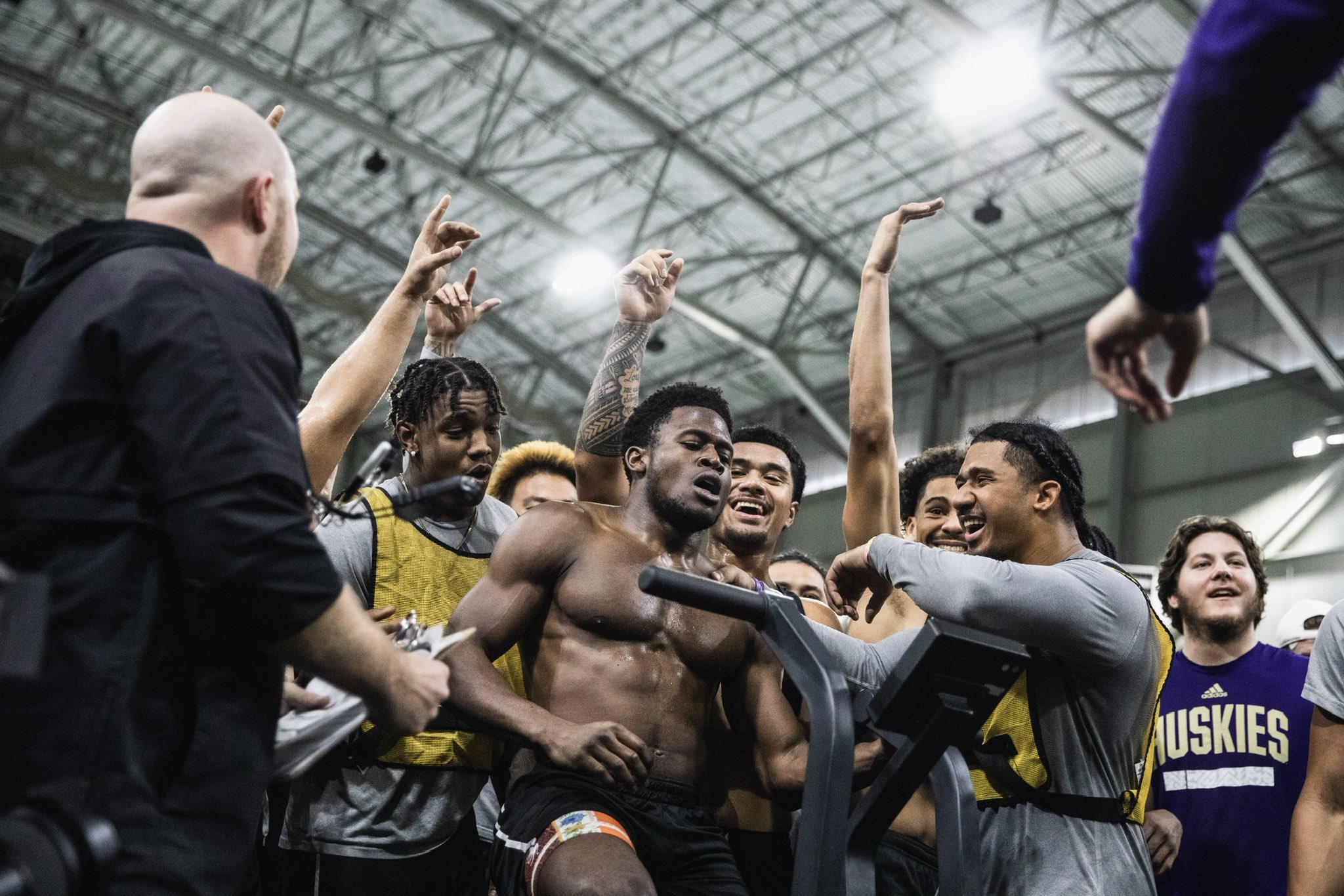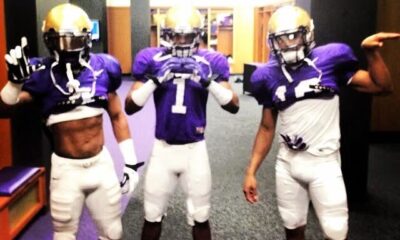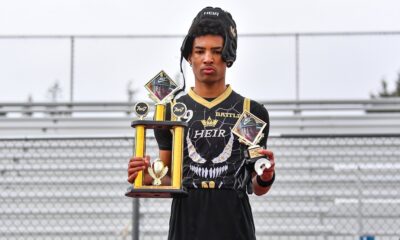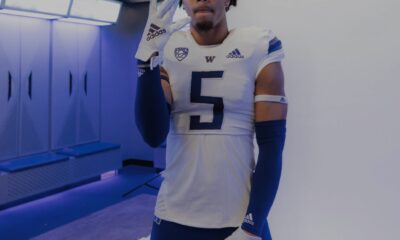“I don’t really do this public speaking thing,” Jason Robinson, Jr. said as he stood up in front of a packed banqueting room in the Husky Stadium complex. The 4-star receiver was on his official visit to the University of Washington on a Friday night in late June earlier this summer.
He was addressing Washington coaches including head coach Kalen DeBoer, and offensive coordinator Ryan Grubb.
Among others, at Jason’s table sat receivers coach JaMarcus Shephard and new enrollee Taeshaun Lyons. Scattered around the room were a dozen or so recruits on their own official visit, alumni who are now with Microsoft, Starbucks, and other Seattle-based corporations…including former Husky linebacker and current Mayor of the City of Seattle, Bruce Harrell.
Pressure? He was used to pressure. Not so much, but a fear that he shares with most Americans is public speaking—or Glossophobia.
Jason isn’t the only one that “doesn’t do public speaking” as it’s generally the top fear of most Americans. But the 5-11, 177-pound pass catcher juked fear in its tracks like a doomed defender.
He had every reason to not stand up and speak–but he also had every reason to.
”He could have just sent out a tweet like any other kid,” said his dad, Jason Robinson, Sr. “But he’s not just any other kid.”
He knew that the announcement he was about to make would be received by people who would have his back for the rest of his life. When he falls, they’ll be there to pick him up.
As he rose to his feet, he knew that he was not going to be judged about his delivery or choice of words. He was becoming a Dawg for Life.
Athletes are often mentally wired differently than most people—especially at the collegiate level. They wake up before dawn to do a workout, study for school, study game film, and physical therapy long before most of us are awake. Over the course of their 16-hour day, they eat, sleep, drink academics and athletics.
Being so far away from family, they’re looking for another one to be a part of when they choose a school.
The first thing that DeBoer did when he arrived at Washington was tap into the family and acceptance side of the brain–in terms of Maslow’s Hierarchy of Needs
He continuously feeds the “family and acceptance” part of the mind, and it becomes so overpowering, so domineering that a phobia such as the fear of public speaking is squashed because there’s no room for it. Phobias that aren’t fed–die in darkness.
Sure, there’s the fear component that continues to exist—that side of the brain that keeps us from doing stupid things.
But for Jason, the signals that Glossophobia was sending out to his body–the shaking hands, the sweaty palms, the cracking voice–went unrequited. There were some butterflies, but they wouldn’t stand in his way.
For that evening, surrounded by new extensions of his family, he represented the rewiring of Washington’s player’s brains. When DeBoer took over, he had a veteran group that had been vetted by Chris Petersen. Up and down the roster, there were players who would give up personal glory for the good of the team.
It was a tight-knit group, so DeBoer’s task to turn the program around wasn’t monumental. But in order to do so, in short order, he’d have to address the team’s psyche (the Greek word for ‘soul’).
Over the pandemic, the team as a whole had regressed on American Psychologist Abraham Maslow’s Hierarch of Needs chart.
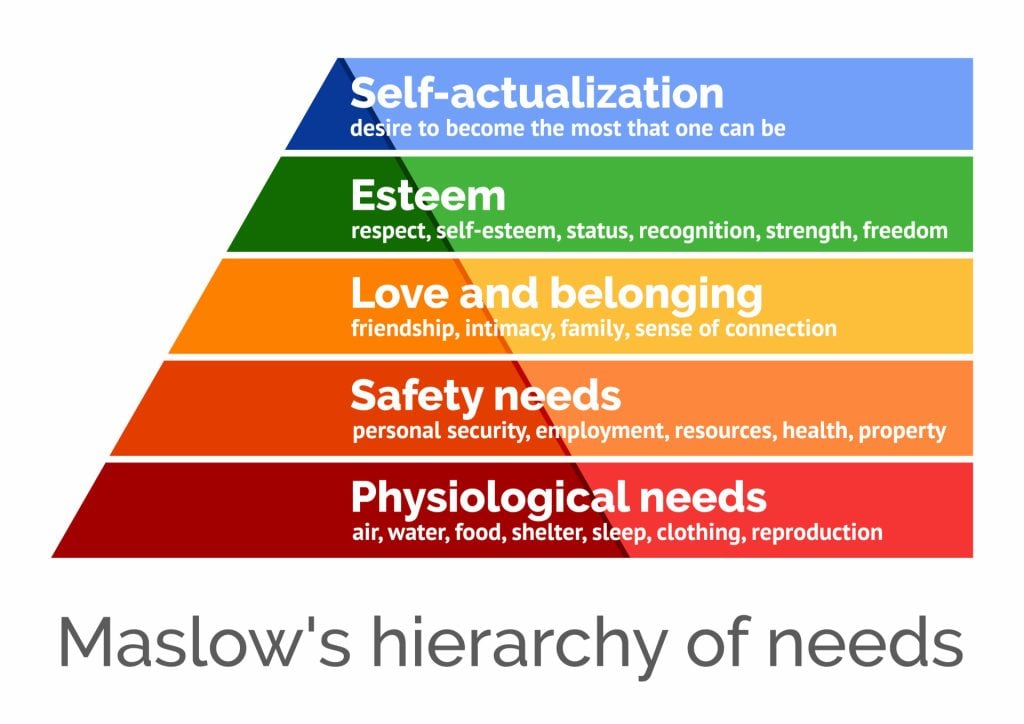
Being separated even from their own position groups for so long, the team had descended from “Esteem,” past “Love and Belonging,” and all the way down to “Safety Needs”.
They were striving for wins, but they were left starved of victories. They had signed up for the purple and gold on the heels of back-to-back-to-back New Year’s 6 Bowl Game experiences. Expectations were high when they arrived on campus, but between 2020 and 2021, Washington had accrued a win total of 7 games.
By the end of the 2021 season, I’d say that the team was sitting just barely above the “Physiological Needs,” as their employment as football players was in doubt.
Parents of players had taken to social media, publicly demanding that the university make a coaching change–or else their sons would be playing football elsewhere in the 2022 season.
By the end of the 2021 season, chaos had let loose.
There were over 20 players rumored to be looking to enter the Transfer Portal after the season, but that number may have exceeded 30 by some estimations. Washington, it seemed, was headed for a Colorado-type of reset.
It would take a special man to save Washington. He’d first have to transform the players’ hearts, and then their heads to the mindset that enabled a high school football player named Jason Robinson to stand in front of a packed room and flawlessly deliver the speech of his young life.
In Part 2, RealDawg.com will take you inside with an exclusive look into how Kalen DeBoer and company were able to take a 4-win team to the brink of a playoff appearance in 12 short months.

